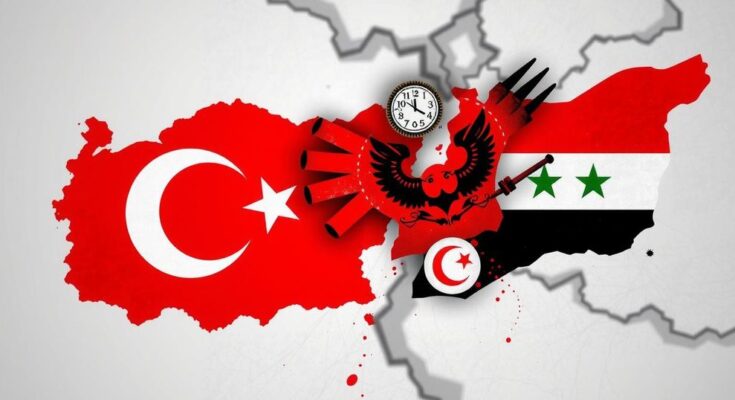The fall of Bashar al-Assad in Syria signifies a pivotal moment for Turkey, enhancing its regional influence but presenting strategic challenges for President Erdogan. Following Assad’s rejection of Turkish cooperation, Erdogan’s backing of rebel forces has resulted in significant territorial gains. The future of Kurdish forces and geopolitical dynamics with Russia remain uncertain as Turkey seeks to solidify its position in northern Syria amidst rising tensions and changing governance.
The recent overthrow of Bashar al-Assad in Syria marks a significant turning point, potentially enhancing Turkey’s regional influence while simultaneously presenting strategic challenges for President Recep Tayyip Erdogan. Following Assad’s rejection of Erdogan’s cooperative overtures, Turkish-backed rebel forces, particularly Hayat Tahrir al-Sham (HTS), executed a surprise offensive that culminated in Assad’s ouster. Erdogan, who has consistently opposed Assad, recognizes the implications of this shift, especially concerning the Kurdish groups in Syria, which he views as a threat to Turkish security. In the immediate aftermath, Turkey appears poised to strengthen its foothold in northern Syria, notably through recent gains in the town of Manbij, previously held by Kurdish forces. Turkish forces continue to patrol significant sections of the Syrian border, aiming to establish a security zone that would eradicate the presence of Kurdish militias tied to the PKK, a group Turkey classifies as terrorist. Although Turkey emerges as a key player in this evolving landscape, questions persist about the future dynamics of the region and whether the new Syrian government will accommodate Kurdish interests or align with Turkish objectives. As Turkey navigates its newfound position, the larger geopolitical ramifications of Assad’s fall will unfold, particularly regarding its relationship with Russia and potential negotiations for a stable Syrian regime that addresses the diverse needs of its population.
The fall of Assad in Syria creates a power vacuum that has substantial implications for regional stability and security. Erdogan’s Turkey, having opposed Assad for years, seeks to capitalize on this opportunity by enhancing its military presence along its border with Syria and exerting influence over the Kurdish forces that operate in the area. Moreover, the refugee situation complicates Turkey’s internal politics, as Erdogan faces pressure to manage the large Syrian refugee population currently residing in Turkey. The intricate political landscape is further complicated by the roles of external powers, including Russia, whose support for Assad has started to wane, thus altering the power dynamics in the region. Understanding these contexts is crucial for analyzing Turkey’s future strategies and the evolving situation within Syria.
In summary, Turkey stands at a pivotal crossroads following Assad’s exit from power, where its actions will define not only its regional role but also the future of Kurdish autonomy in Syria. The marriage of Turkish military ambitions with the unpredictable outcomes of the new Syrian governance will determine the trajectory of security and stability in the region. As Erdogan pushes for a southern border security zone, the international community will closely watch how these developments unfold, particularly concerning Turkey’s negotiations with Russia and the potential impact on its vast refugee population.
Original Source: www.france24.com




